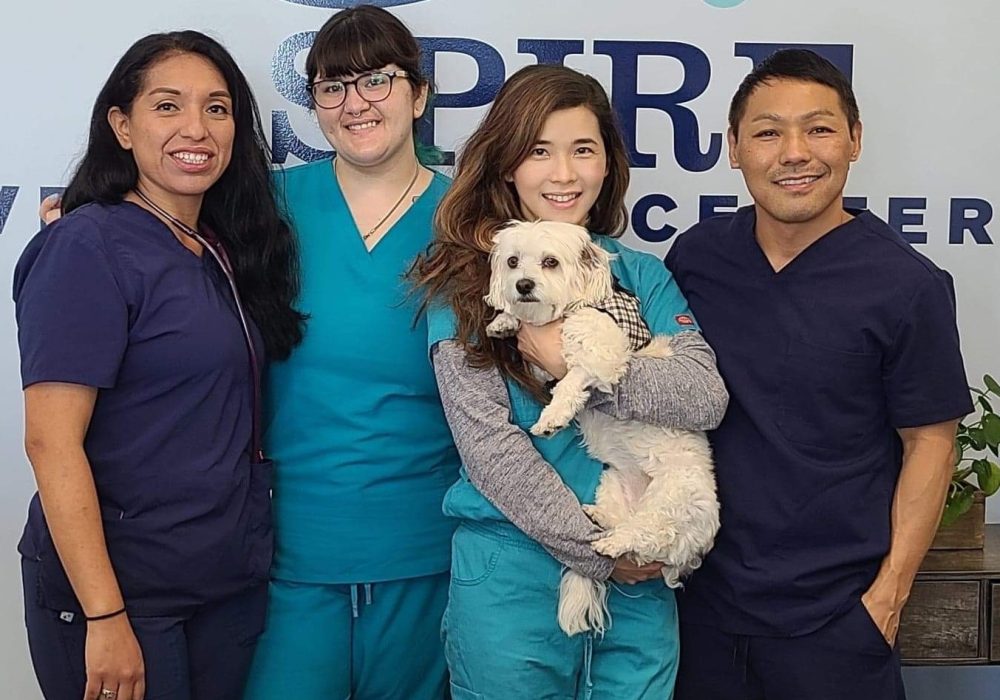Vaccines
Keeping your pet up-to-date with their vaccinations is the most cost effective way to keep them healthier for longer. Aspire Veterinary Center can help you with all your pet’s vaccination needs. Give us a call TODAY!

Pet Vaccines in La Palma, CA
Vaccinations are essential for cats and dogs because they protect them from many common diseases that are both serious and highly contagious and can threaten your pet’s long-term health and well-being. At Aspire Veterinary Center, we offer pet vaccinations in La Palma, CA, that can help your pets live longer, healthier lives.
What are Pet Vaccinations?
Pet vaccines provide immunity against diseases by preventing the symptoms of the disease or lessening the severity of those symptoms. Vaccines contain a harmless form of the bacteria or virus that causes the disease your pet is being immunized against. The bacteria or virus is killed, greatly weakened, or broken down into smaller parts before use in the vaccine so that they can trigger an immune response without making your pet sick. Once administered to your pet by injection, by mouth, or through the nose, your pet’s immune system will attack the harmless form of bacteria or virus from the vaccine and will produce antibodies to fight it off. Your pet’s immune system then keeps a memory of the disease, so if your vaccinated pet encounters the disease later, their immune system is ready to fight it off and prevent a future infection from developing.
What Kinds of Vaccines Does Aspire Veterinary Center Offer?
At Aspire Veterinary Center, we follow the American Animal Hospital Association’s guidelines for pet vaccinations and offer the following pet vaccines:
Cat Vaccines
- FVRCP: The FVRCP vaccine is extremely effective in protecting your kitty against three highly contagious and life-threatening feline diseases: Feline Viral Rhinotracheitis, Feline Calicivirus, and Feline Panleukopenia.
- Rabies: Rabies is a viral infection that affects the cat’s nervous system. The prognosis for unvaccinated cats is poor, however, this disease is highly preventable with vaccination. Most US states do require cats to receive a rabies vaccine because rabies is transmittable to humans.
- FeLV: This vaccine helps prevent feline leukemia virus (FeLV) infections. FeLV depresses your cat’s immune system and can cause anemia and several types of cancers. Because there is no treatment for FeLV, once contracted, the disease can be fatal. Preventing infection through vaccination is highly recommended.
Dog Vaccines
- DAPP: This vaccine protects against Canine Distemper Virus, Canine Adenovirus Types 1 & 2, Canine Parainfluenza Virus, and Canine Parvovirus.
- Lepto: This vaccine protects against Leptospirosis, which is caused by bacteria that is spread through soil, water, and the urine of infected animals, and if not caught early, it can be deadly. Leptospirosis is currently the most common zoonotic disease in the world, which means it can be transmitted from animals to humans. While the Lepto vaccine is not a required immunization for dogs, it is highly recommended for any dog that frequently goes outside, even just to go to the bathroom in the backyard.
- CIV: The CIV vaccine helps prevent diseases associated with Canine Influenza Virus H3N2 and H3N8 infections.
- Bordetella: Proof of the bordetella vaccine for dogs is usually required if you plan to board your puppy or dog, place it in daycare, or attend group training classes. Bordetella is a highly infectious bacterial infection that is the primary cause of kennel cough, a cold- or flu-like illness that causes coughing and vomiting. Although rare, it can also result in seizures and death.
- Rabies: Rabies vaccines for dogs are required by law in the US. All dogs should be vaccinated for rabies at approximately 12 – 16 weeks and then again at one year.
Do Pet Vaccinations Have Side Effects?
Modern pet vaccines are highly effective and safe. It is common for pets to experience mild side effects following vaccination, similar to humans. Common side effects include soreness and swelling at the injection site, low energy, decreased appetite, and fever. In rare cases, your pet may need medical attention for these common side effects, if they last for more than a day or cause significant discomfort.
Less common side effects are vomiting, diarrhea, and itchy skin, while rare side effects are difficulty breathing, swelling on the face or body, collapse, and seizures. If your pet experiences any of these side effects after a vaccination appointment, please contact us immediately.
How Often Should My Pet Receive Vaccines?
Keep your pets safe by keeping them up to date with their vaccinations. Puppies and kittens should start their vaccine series at 7 – 8 weeks old and every 3 – 4 weeks until 16 – 20 weeks.

Vaccinations at Aspire Veterinary Center in La Palma, CA
At Aspire Veterinary Center, we believe prevention is the key to helping your pets live longer, healthier lives. Contact us today to schedule your pet’s vaccination appointment! We look forward to taking care of your pet.
